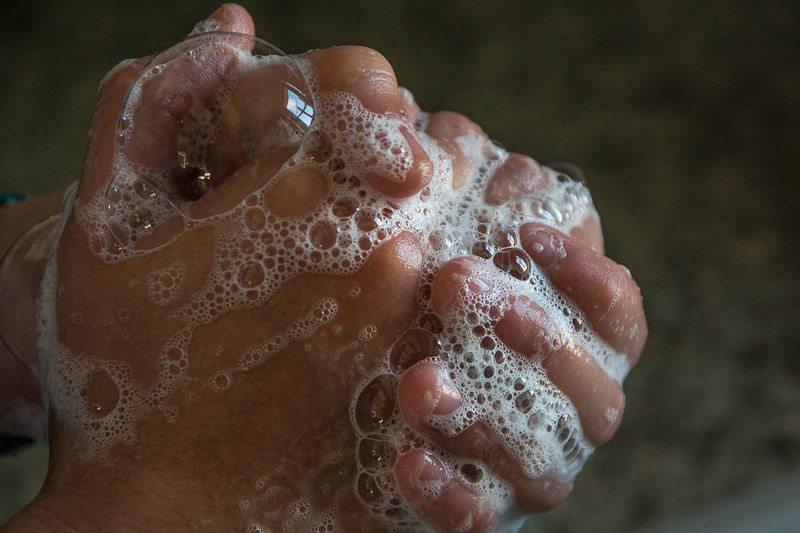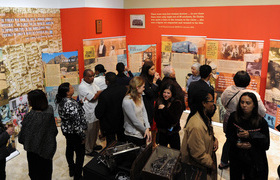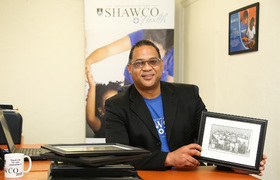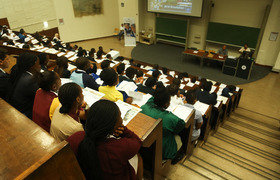SHAWCO’s COVID-19 info and soap outreach
30 March 2020 | Story Helen Swingler. Read time 4 min.
The health division of the Students’ Health and Welfare Centres Organisation (SHAWCO) was hard at work disseminating COVID-19 information pamphlets and soap in local townships before the 21-day lockdown – with an aim to curb the rise of coronavirus infections – began at midnight on 26 March.
The University of Cape Town (UCT) student-run outreach distributed two sought-after commodities: information – in the form of health pamphlets in English, isiXhosa and Afrikaans – and soap bars. These were dispensed in communities where SHAWCO hosts health clinics.
For the past 77 years, SHAWCO has been providing primary healthcare services and a range of educational services to under-resourced communities in and around the Cape.
“Like UCT, SHAWCO clinics are currently closed [for lockdown], so the money that would have been used to run clinics was diverted to this health promotion project. This was augmented with donations from the Rotary Club and the public, specifically the Ockhuisen family,” said SHAWCO Health president Sana Salduker.
“We distributed over 10 000 pamphlets and 7 000 bars of Dettol soap and we have 3 000 bars reserved in case of outbreaks in specific areas,” said Salduker, who has been assisted by Robyn Kamau, SHAWCO Health vice-president.
“The aim of this was to limit any unnecessary contact between people.”
“We chose distribution sites based on the safest options available in each area, mainly public places providing ‘essential services’, such as clinics and police stations, that will be open during lockdown and that people will have to visit or walk past. We also partnered with multiple NGOs that are providing essential food services and will distribute our pamphlets and soap while carrying out their services. The aim of this was to limit any unnecessary contact between people.”
SHAWCO members were hard at work disseminating COVID-19 information pamphlets and soap in local townships before the 21-day nationwide lockdown. Photos Robyn Kamau.
The communities included were Masiphumelele, via the NGO Living Hope; SHAWCO’s clinics in Barcelona and New Rest in Gugulethu, and via two soup kitchens there; the SHAWCO Simthandile clinic in Khayelitsha, with distribution via the Meals on Wheels programme; the local clinic at Brown’s Farm; and SHAWCO clinics at Imizamo Yethu, via the local community health workers.
They also distributed soap and pamphlets at The Haven Night Shelter and the Cheshire Home for the disabled. Distribution was also extended to sites that were serviced by SHAWCO’s education outreach in Kensington and Manenberg, via community clinics, police stations and schools.
“These operations were carried out from Monday to Wednesday by the Health Steering Committee with the assistance of Cecil Constant and Cyril Pelston, both SHAWCO retirees.
The SHAWCO clinics have now gone into hibernation following the countrywide lockdown.
“Both student volunteers and community members are disappointed that clinics have been put on hold but understand that this is in the best interest of all in order to limit the spread of the virus,” said Salduker.
“It was important to us to maintain a presence in the communities … and do what we can to further health promotion.”
“But the communities were very appreciative of SHAWCO’s support and efforts to provide some form of protection and education about the coronavirus outbreak. It was important to us to maintain a presence in the communities we usually have clinics in and do what we can to further health promotion so that community members don’t feel abandoned during this difficult time.”
In many cases, community health workers reported that the correct information regarding the COVID-19 outbreak had not reached some communities and that large gatherings were still occurring.
“Our hope is that this health promotion project empowers communities by teaching people about the importance of isolation, as well as providing them with tools to protect themselves,” said Salduker.
 This work is licensed under a Creative Commons Attribution-NoDerivatives 4.0 International License.
This work is licensed under a Creative Commons Attribution-NoDerivatives 4.0 International License.
Please view the republishing articles page for more information.















